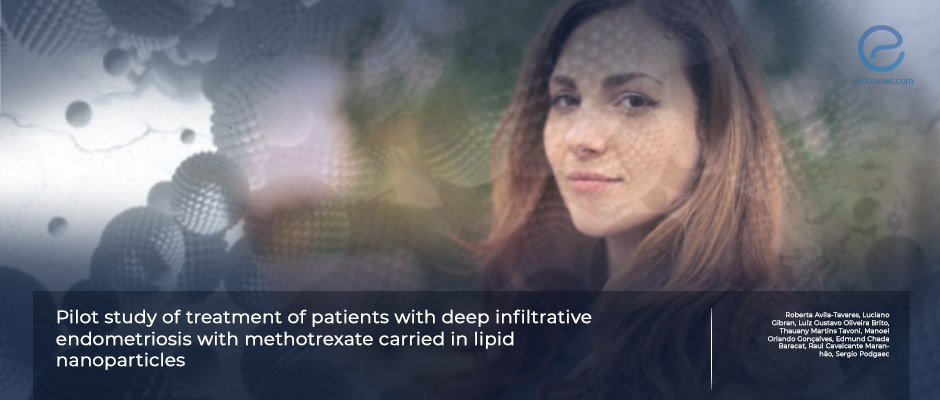Potential New Therapeutic Avenue for Deep Endometriosis
Dec 14, 2023
Lipid nanoparticles carrying methotrexate may be a novel therapeutic option for women with deep infiltrating endometriosis.
Key Points
Highlights:
- Lipid nanoparticles carrying methotrexate seem to be safe and feasible in women with deep infiltrating endometriosis treatment.
Importance:
- Lipid nanoparticles carrying methotrexate may be a novel therapeutic avenue for women with deep infiltrating endometriosis.
What’s done here:
- Researchers conducted a prospective pilot study in 11 women with deep infiltrating endometriosis with rectosigmoid lesions.
- Of the 11 women,3 were given a single intravenous dose of lipid nanoparticles carrying 25 mg/m2 of methotrexate, and 8 were given two at a one-week interval.
- Clinical complaints were assessed, and the blood count and biochemistry were analyzed 90, 120, and 180 days later and compared to pre-treatment values.
- Endometriosis lesions were evaluated with transvaginal and pelvic ultrasound before treatment and at 30th and 180th days.
Key results:
- Treatment with lipid nanoparticles carrying methotrexate led to a reduction in deep dyspareunia, chronic pelvic pain, and dyschezia scores.
- There was also a trend towards a reduction in dysmenorrhea scores.
- The endometriosis lesions remained the same following treatment.
- There were no treatment-related clinical complaints or blood, kidney, or liver toxicities and hormone levels remained within the normal range.
Limitations:
- This was a small study in only 11 patients with endometriosis.
- There was no placebo group and the effects in pain reduction may be caused by a placebo effect, which is accentuated by the fact that the lesions remained unchanged in ultrasound.
Lay Summary
The use of lipid nanoparticles carrying methotrexate seems to be safe and feasible in women with deep infiltrating endometriosis, according to a new study published in the scientific journal Archives of Gynecology and Obstetrics. The approach could, therefore, be a new therapeutic option for the disease. However, “more prolonged treatment schemes should be tested in future placebo-controlled studies,” according to the authors.
Lipid nanoparticles carrying methotrexate were previously tested in women with endometriosis and shown to concentrate in endometriosis lesions.
In the present study, researchers from Brazil led by Dr. Sergio Podgaec assessed the effect of the nanoparticles in treating deep infiltrating endometriosis. The team analyzed a total of 11 women with the disease, ages 30 to 47 whose visual analog scale pelvic pain scores were over 7. All women had rectosigmoid lesions. Of the 11 women, 3 were given a single intravenous dose of lipid nanoparticles carrying 25 mg/m2 of methotrexate while 8 were given two at a one-week interval.
The researchers then assessed the clinical complaints and analyzed the blood count and biochemistry of the women 90, 120, and 180 days later and compared them to values before the start of treatment. They also evaluated the lesions with transvaginal and pelvic ultrasound before treatment and 30 and 180 days later.
They found that scores for deep dyspareunia, chronic pelvic pain, and dyschezia were all reduced following treatment. There was also a trend towards a reduction in visual analog scale scores for dysmenorrhea, but this was non-significant.
Endometriosis lesions remained the same on ultrasound. There were no differences in terms of clinical response between the two tested doses. In terms of side effects, there were no clinical complaints related to the treatment, nor were there blood, kidney, or liver toxicities. Hormone levels were also within the normal range during the treatment.
Methotrexate is a chemotherapy agent, which suppresses the immune system. It was originally developed and continues to be used for several types of cancer, autoimmune diseases, and ectopic pregnancies.
Research Source: https://pubmed.ncbi.nlm.nih.gov/37987824/
Deep infiltrating endometriosis medical treatment pilot study dyspareunia pelvic pain

